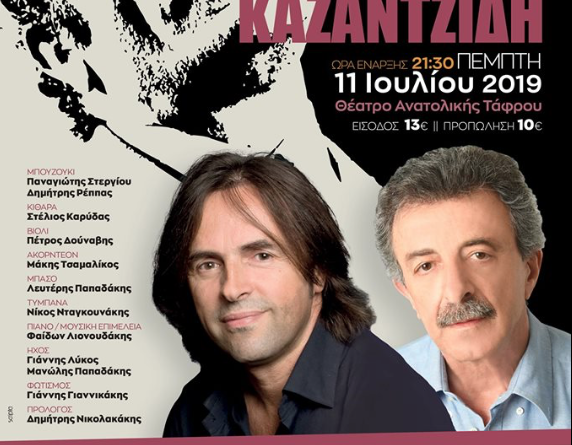Concert: Tribute to Stelios Kasantzidis- Chania 11th July
Stelios Kasantzidis was and is known for his way of expressing the undiluted social and emotional upheaval that the Greeks went though after the Second World War and the Civil War. Nearly a million left as migrant workers between 1950 and 1975 – mostly for Australia, Germany and North America – a malevolent fate collectively known as the xerizoma, or uprooting
WHEN: 11th July 21.30
WHERE:Eastern Moat Theatre (Theatro Anatolikis Tafrou), Nikiforou Foka /Kyprou, Chania
Entrance 13 euros.
Pre-sale 10 euros
From 20th June until the day of the concert, there will be the ticket pre-sale at the Sweet Corner shop in Tzanakaki Street and LA-SI-DO in Koraka Street 4 and BOX , 11, El. Venizelos Street.
From 3rd until the day of the concert at the ticket booth inside the Municipal Garden (KIPOS)
Interpreters: Vasilis Lekkas, Tasos Psallidakis
Accompanied by Christina Alexandri
El. Bass … ……. Lefteris Papadakis
Drums ………… .Nikos Dagounakis
Accordion ……… ..Makis Tsamalikos
Keys ………… .The Danube River
Guitar …… .. Stelios Karydas
Bouzouki ……… .Panagiotis Stergiou
Bouzouki ………. Dimitris Reppas
Piano …………… .. Phidion Lionoudakis
Source: CAM
Stelios Kasantzidis:
Kazantzidis was born in Nea Ionia, one of the refugee neighborhoods that sprang up in Athens after the destruction of the ancient Greek homelands of Anatolia with the end of the Ottoman empire and the birth of Ataturk’s Turkey in the 1920s. From his mother and his grandmother, he learnt many songs about xenitia – the life of uprooted Greeks in foreign lands – and how to inject klama (crying) into the voice. During the Nazi occupation, his family fled to a village in northern Greece, where he developed a lifelong respect for animals and farming and, gradually, a hatred for the state, “thieving” bankers and record producers.
In 1947, his father died from the beatings he received during and after the war as a communist. Young Stelios provided for his mother and younger brother by selling cigarettes around central Athens. Eventually, he started earning his living by singing in tavernas.
During national service, he met his first great love, who we know only through the pseudonym “Kate Gray”. She was an older brunette who liked to peel his olives, cooked for him, and taught him about love. As a soldier, Stelios was persecuted by his rightwing officers. In those days, the bouzouki , an instrument of the urban classes, was considered more dangerous than a Molotov cocktail. He was exiled for a while on the island of Macronisos and tortured.
In the 1950s, he began working with rembetika giants like Manolis Hiotis and Vasilis Tsitsanis, as well as Mikis Theodorakis – Kazantzidis turned many of their compositions into enduring hits. His first big successes as a singer and composer were Society You Condemn Me, followed by I Want To Die. Between 1957 and 1965, he established his unique style.
Meanwhile, the flood of Greek emigrants carried his voice and his songs of separation around the world, and their children, born in the xenitia grew up under the influence of that voice. In Latin America, Greek immigrants made Kazantzidis so famous that he was named gardeliakis, an honorary title likening his name with the king of the tango, the Argentinian Carlos Gardel.
After separating from “Gray”, in 1955 he met the singer Marinella, then the talented teenage daughter of Greek refugees from Istanbul. They fell in love, and he launched her career. She often protected him from the violence that came with the busi ness. Eventually, they married, but divorced amicably in 1965.
During the years of the colonels’ junta (1967-74), Kazantzidis was singled out by the regime for punishing taxation. Locked into an unhappy record deal, he made no recordings between 1975-87, although he remained a star, especially in the Greek diaspora. He made a resounding comeback in the 1990s as scores of Pontic and Caucasus Greeks fled the former Soviet Union – a movement that inspired him to record a series of songs from his ancestral land, the Pontos, now in northeastern Turkey. However, he respected Turkish musical traditions and even sang in that language rather than his native Greek.
Kazantzidis’s style can seem painful to the senses but, with his gentle manliness and scorn for luxury, he gave dignity to the lives of millions of Greeks during one of the most difficult times of their history. He is survived by his wife, Vasso Kolovou-Katsarou, whom he married in 1982.
Stelios Kazantzidis, singer, born August 29 1931; died September 14 2001 (Source: The Guardian)



